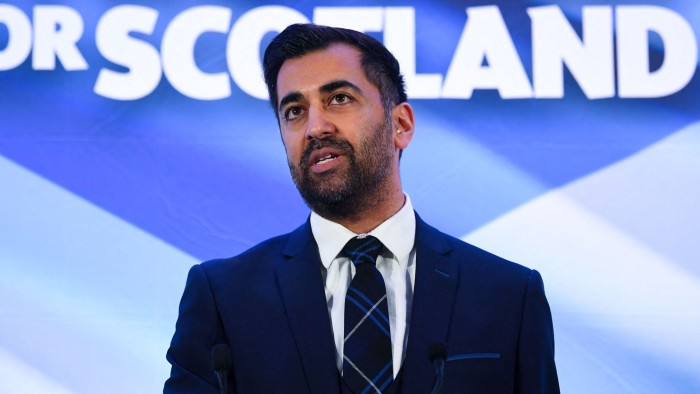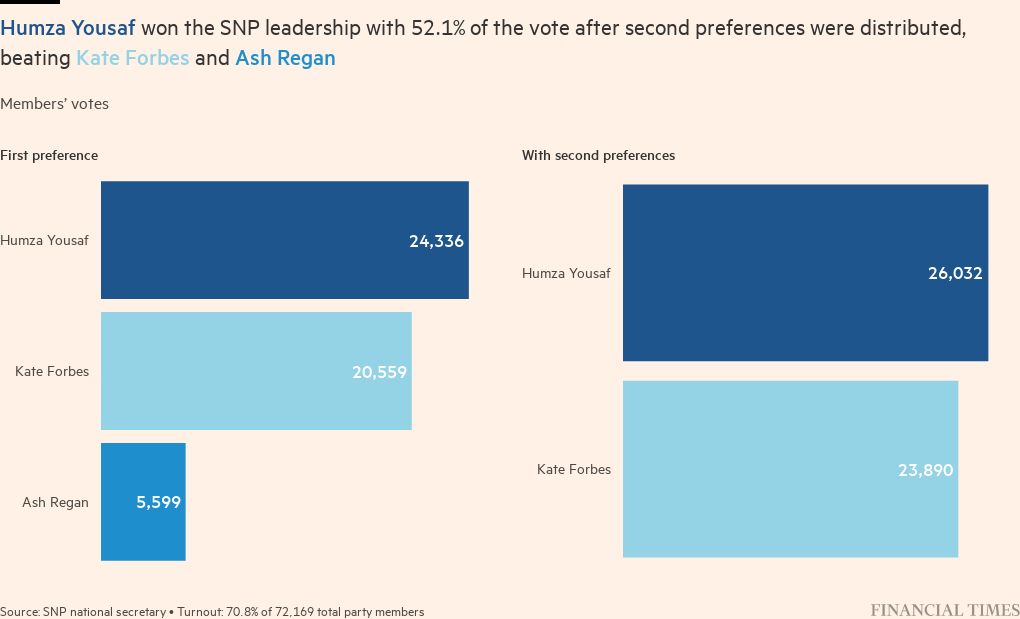Humza Yousaf wins SNP leadership election

Roula Khalaf, Editor of the FT, selects her favourite stories in this weekly newsletter.
Humza Yousaf on Monday won a closely fought and often bitter race to succeed Nicola Sturgeon as leader of the Scottish National party, paving the way for him to become Scotland’s first minister.
The 37-year-old health secretary won 52.1 per cent of the votes cast by SNP members, beating finance secretary Kate Forbes who secured 47.9 per cent.
The closeness of the race means that Yousaf faces a difficult task healing divisions in the pro-independence SNP that were exposed after Sturgeon’s shock resignation last month.
He pledged to mend SNP differences “quickly”, and sought to reach out to the broader Scottish electorate, saying: “I will aim to lead Scotland in the interest of all of our citizens, whatever your political allegiance.”
Yousaf is set to become Scotland’s first leader from an ethnic minority background when he is sworn in as first minister on Wednesday after a parliamentary vote on Tuesday.
The vote should be a formality after the Scottish Greens reaffirmed their support for a co-operation agreement they have with the SNP, which ensures a pro-independence government in Edinburgh.
In the SNP leadership race, Yousaf presented himself as the defender of Sturgeon’s progressive policies on social issues.
He was the only candidate committed to fighting the UK government’s move to block Scottish legislation that would make it easier for trans people to obtain legal recognition of their gender.
But Yousaf made it clear that he did not support Sturgeon’s plan to use the next UK general election as a “de facto” referendum on Scottish independence, stressing instead a more gradual approach to securing the SNP’s cherished goal by trying to increase public support over time.
Scots are divided roughly in half on the question of independence, according to opinion polls, after voters decided by 55 per cent to 45 per cent to stay in the UK in a referendum in 2014.
Yousaf told ITV News on Monday that he would quickly renew the Scottish government’s longstanding request to Westminster for a so-called section 30 order authorising another independence referendum.
But Conservative UK governments have repeatedly refused such permission since 2014, and Rishi Sunak’s spokesperson confirmed this stance.
Beyond the independence debate, Yousaf must convince Scots that he can fix Scotland’s NHS, improve educational standards and repair strained ties with business.
He will also face questions over SNP funding. Police in 2021 launched an investigation into claims that funds raised by the SNP for a future independence referendum were spent on other things.
Yousaf declined to answer questions about the make-up of his cabinet, which will not involve Sturgeon or John Swinney, the deputy first minister who has also announced that he is stepping down.
Yousaf stressed the need for SNP unity, in a stance that hinted at the possibility of a ministerial job for Forbes.
During the SNP leadership race, Forbes attacked Yousaf’s record in government and said she could win broader public support and boost the party’s stalled campaign for Scottish independence.
Forbes said after Yousaf’s victory that the SNP remained united despite a leadership race characterised by “robust” exchanges over policy.
Voting in the SNP leadership contest hinged on members’ second preferences after none of the three candidates initially managed to secure 50 per cent of the ballots cast.
Former community safety minister Ash Regan was eliminated after coming last in members’ first preferences.
Anas Sarwar, leader of the Scottish Labour party, said Yousaf was inheriting a “chaotic and divided party” and lacked his own mandate. “We need an election now,” he added.
Douglas Ross, leader of the Scottish Conservatives, said Yousaf’s victory showed that the SNP was moving “further and further away from the real priorities” of Scots.

Comments